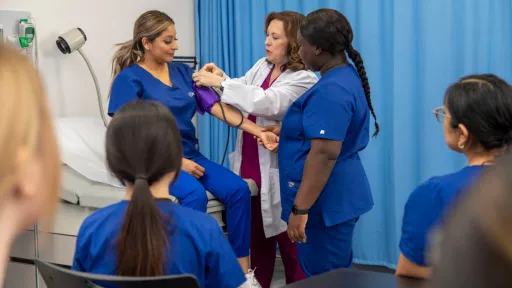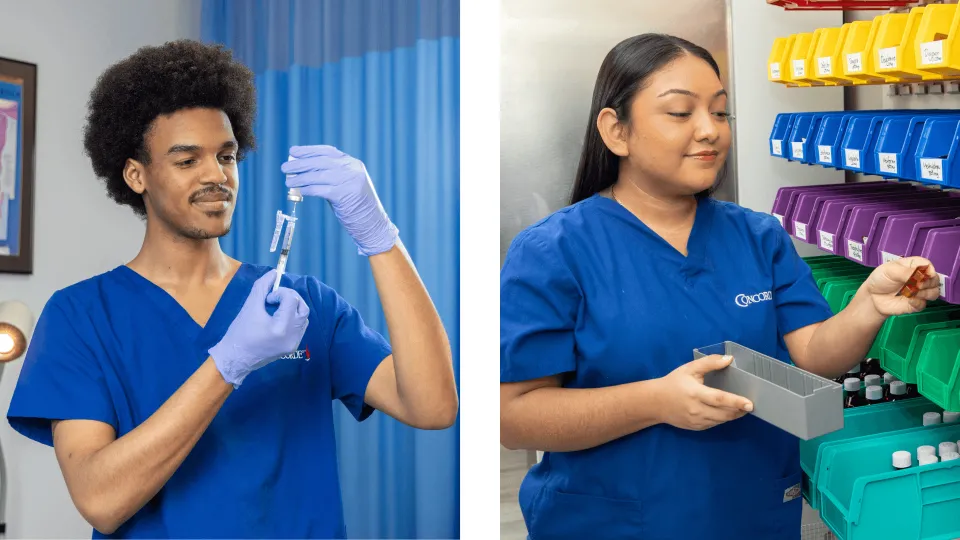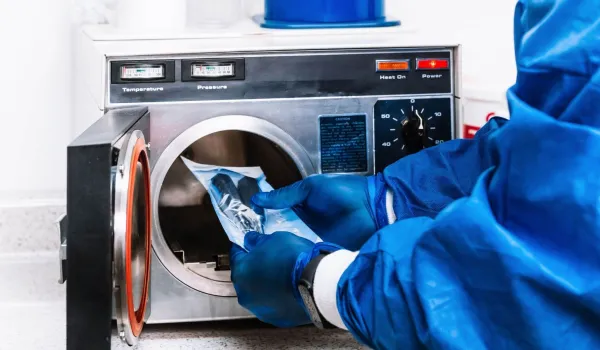
The health care industry is expanding rapidly, and medical assistants (MAs) are crucial in this development. With the Bureau of Labor Statistics projecting a 15% job growth for MAs from 2023 to 2033, greater than the average for all occupations, this career path offers promising opportunities. MAs work in clinical and administrative capacities, making them vital to health care teams. Training to become an MA may appeal to those seeking a quick entry into the health care field. Here, we answer the question, "How long does it take to become a medical assistant?"
Overview of MA Training Options

Aspiring MAs have various flexible educational paths available to them. The main programs include:
- Certificate/diploma programs: These programs are often the quickest route, typically taking less than a year to complete.
- Associate degree programs: These take about two years to complete and offer a more comprehensive education.
- Online and hybrid program options: These courses offer greater flexibility and shorter completion times, which may suit those balancing other responsibilities.
Concorde Career College offers the Medical Assistant diploma program at all 17 campuses. The diploma gives students the opportunity to learn and practice the knowledge and skills they need to pursue a career as an MA.
Related: Understanding the Job of a Medical Assistant
Certificate and Diploma Programs
Certificate and diploma programs often take around nine months to complete. For example, students may complete clinical MA programs at some US colleges in 36 weeks. Available evening classes make it easier for working students to pursue their education.
The program includes instruction from experienced medical professionals on relevant subjects such as pharmacology, medical assisting, health basics, phlebotomy, and administrative procedures.
Admission requirements typically include the following:
- Completed application: Students submit a completed application form to the institution offering the MA program. This form includes personal information, educational background, and relevant work experience.
- High school diploma or certificate: Applicants generally need a high school diploma or a GED certificate.
- Placement evaluation: Many programs require applicants to undergo a placement evaluation to assess their proficiency in subjects such as mathematics and English.
- Prerequisite courses: Some programs may require completion of specific courses before admission. These courses often include subjects such as biology, anatomy, and medical terminology.
Related: Medical Assistant: A Comprehensive Guide to the Profession
Associate Degree Programs

Pursuing an associate degree in medical assisting is a popular pathway for those looking to enter health care. These programs typically last two years and provide comprehensive training in clinical and administrative tasks. Graduates may work in medical offices, clinics, and other health care settings. The curriculum often includes courses in human anatomy, medical terminology, pharmacology, and office administration.
A significant benefit of pursuing an associate degree is the opportunity to earn college credits that may be transferable to bachelor's degree programs in health care fields, allowing for potential educational and career advancement. Some colleges provide evening programs, offering flexibility for students balancing work or other commitments, even if these programs take longer to complete.
To enroll in an associate degree program for medical assisting, students typically need to meet the following requirements:
- High school diploma or GED: Proof of completion of secondary education.
- Official transcripts: Submission of academic records from previous institutions.
- Placement tests: Some programs may require ACT/SAT scores or placement tests to determine course eligibility.
- Immunization records: Proof of required vaccinations to ensure the safety of all students and patients.
- Free Application for Federal Student Aid: Completion of the FAFSA to determine eligibility for financial assistance.
- Proof of residency: Documentation to confirm residency status, which may affect tuition rates.
Related: A Day in the Life of a Health Care Student
Online and Hybrid Programs
These programs allow students to earn an MA diploma from institutions such as Concorde in as few as nine months. Students may complete the program through a hybrid model, which offers a blend of online study, on-campus laboratory work, and practical training.
Pros of Online/Hybrid Programs
Here are some of the benefits of online and hybrid MA programs:
- Flexibility: Students can access online courses at any time, making it easier for them to study around their schedules. Some online programs provide morning and evening classes.
- Cost-effective: Online and hybrid programs can be less expensive due to reduced commuting and accommodation costs.
- Self-paced learning: Students can progress through the material at their own pace.
- Practical experience: Online and hybrid programs typically include an in-person externship component, ensuring students receive hands-on training.
Cons of Online/Hybrid Programs
While there are many positive aspects to online and hybrid learning, there can also be some drawbacks:
- Limited hands-on training: Online programs may lack the comprehensive hands-on training that traditional programs offer.
- Less interaction: Some students may find it challenging to stay engaged without in-person interaction with instructors and peers.
- Self-discipline required: Students may need strong time-management skills to pursue online coursework.
Pros of Traditional Programs
In-person programs continue to be the primary method for obtaining a medical education.
- Hands-on training: Traditional programs often provide extensive hands-on training.
- Structured environment: A classroom setting offers a more structured learning environment, which some students may prefer.
- Peer interaction: In-person programs allow direct interaction with peers and instructors, fostering a collaborative learning experience.
Cons of Traditional Programs
Some of the drawbacks of traditional programs include:
- Less flexibility: Fixed schedules may be challenging for students with other commitments.
- Higher costs: Traditional programs can be more expensive due to additional costs, such as commuting and campus fees.
- Time-consuming: Attending classes on campus might be more time-consuming compared with studying online.
Factors Affecting Program Length
Several factors could influence an MA program's length. Understanding these may help prospective students make informed decisions:
- Program type: Certificate programs are usually shorter, ranging from four to 12 months, while associate degree programs often take up to two years.
- Enrollment status: Part-time students may need 18 to 24 months to complete programs, while full-time students may complete them faster.
- Prior education: Previous coursework or related experience sometimes shortens the program duration.
- Accelerated programs: Some programs offer accelerated tracks that students may complete in as little as four to six months.
- Certification exam preparation: Preparing for and taking the certification examination might add weeks or months to the overall timeline.
Certification and Licensing Requirements
While not all states require certification, obtaining it may enhance job prospects and demonstrate competence to employers. The Certified Medical Assistant examination, administered by the American Association of Medical Assistants, is a common certification for MAs. It consists of 200 multiple-choice questions over four 40-minute test periods.
Maintaining certification requires continuing education every 60 months. While California doesn't require certification, many employers prefer or require certified MAs. The CMA certification examination had a 76% pass rate from July 2023 to July 2024.
Related: RMA vs. CMA: Comparing Medical Assistant Certifications
Job Outlook and Career Advancement

Related: A Day in the Life of a Medical Assistant
The job outlook for MAs is promising. The Bureau of Labor Statistics projects employment for MAs to grow by 15% from 2023 to 2033. This equates to about 119,800 job opportunities for MAs annually over the next 10 years. Many of these anticipated openings may replace workers who transition to other occupations or exit the labor force through retirement.
Specializing allows MAs to focus on specific patient populations or medical conditions, enhancing their expertise and career prospects. Medical assistants may specialize in areas such as:
- Pediatrics: MAs specializing in pediatrics work with children and assist pediatricians with patient care.
- Cardiology: MAs in cardiology assist cardiologists with various tasks, such as taking ECGs, preparing patients for stress tests, and providing patient education.
- Dermatology: These MAs work with dermatologists to help with patient intake, minor surgical procedures, and wound care.
- Chiropractic: These MAs help chiropractors treat patients using various methods, including hot and cold therapies.
- Obstetrics/gynecology: MAs in obstetrics/gynecology support physicians in providing care to women, including prenatal care, assisting with examinations, and patient education.
Becoming an MA is a rewarding career choice that offers flexible training options and a strong job outlook. Depending on the chosen path, the time it takes to become an MA can range from as little as four months to two years. Prospective students should consider factors such as program type, schedule, and specialization to find the best fit for their goals.
Concorde's Medical Assistant program prepares students to succeed in their careers by focusing on essential subjects and developing the skills they need to provide quality patient care. Concorde is institutionally accredited by the Accrediting Commission of Career Schools and Colleges and Council on Occupational Education, depending on the campus location. Explore our offerings and apply online today to start a path toward a fulfilling health care career.
Occupational Outlook Handbook: Medical Assistants, U.S. Bureau of Labor Statistics, https://www.bls.gov/ooh/healthcare/medical-assistants.htm
Certification. (2023). Aama-Ntl.org. https://www.aama-ntl.org/certification
Take The Next Step Towards a Brighter Future
Interested in learning more about our Medical Assistant program?
We have a Concorde representative ready to talk about what matters most to you. Get answers about start dates, curriculum, financial aid, scholarships and more!







